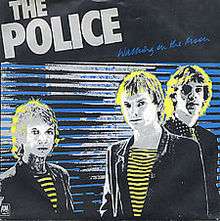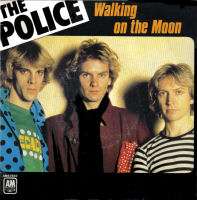Walking on the Moon
"Walking on the Moon" is a song by English reggae rock band The Police, released as the second single from their second studio album, Reggatta de Blanc (1979). The song was written by the band's lead vocalist and bassist Sting. It went on to become the band's second No. 1 hit in the UK.
| "Walking on the Moon" | ||||
|---|---|---|---|---|
 | ||||
| Single by The Police | ||||
| from the album Reggatta de Blanc | ||||
| B-side | "Visions of the Night" | |||
| Released | 4 November 1979 | |||
| Recorded | 1979 | |||
| Genre | ||||
| Length | 5:02 | |||
| Label | A&M | |||
| Songwriter(s) | Sting | |||
| Producer(s) |
| |||
| The Police singles chronology | ||||
| ||||
| Audio sample | ||||
| ||||
| Alternative cover | ||||
 French 7-inch single cover | ||||
Background
Sting has said that he wrote the song when he was drunk one night after a concert in Munich. The following morning, he remembered the song and wrote it down.[1][2]
I was drunk in a hotel room in Munich, slumped on the bed with the whirling pit when this riff came into my head. I got up and started walking round the room, singing 'Walking round the room, ya, ya, walking round the room'. That was all. In the cool light of morning I remembered what had happened and I wrote the riff down. But 'Walking Round the Room' was a stupid title so I thought of something even more stupid which was 'Walking on the Moon'.
— Sting, L'Historia Bandido, 1981[2]
In his autobiography, Sting implies that the song was partially inspired by an early girlfriend:[3]
Deborah Anderson was my first real girlfriend...walking back from Deborah's house in those early days would eventually become a song, for being in love is to be relieved of gravity.
— Sting, 2003[2]
According to Sting, the song was originally recorded "as a rocker" in early versions, but it was reworked.[2] The riff, which is played on the bass, was described as "weird" and "jazzy" by Sting.[2] Guitarist Andy Summers came up with the chord "which hits after the bass notes" throughout the song.[2]
"Walking on the Moon" was released as the follow-up single to the British No. 1 single, "Message in a Bottle," in late 1979. The song was The Police's second number-one hit single in the United Kingdom.[4] It also reached No. 1 in Ireland and No. 9 in Australia but did not chart in the United States. A music video for the song was shot at the Kennedy Space Center in Florida on 23 October 1979. It features the band members miming to the track amidst spacecraft displays, interspersed with NASA footage. Both Sting and Andy Summers strum guitars (not bass) in the video, and Stewart Copeland strikes his drumsticks on a Saturn V moon rocket.
The B-side to the song, "Visions of the Night," was written by Sting. Sting said of the song, "This was the first song I wrote after going to London. It was hard to be serious about the whole thing. I was bemused, much to Stewart [Copeland]'s disgust."[2] According to Copeland, the song was "too cerebral for [the band's] early audiences," so Sting would call it 'Three O'Clock Shit', the title of a rejected Police song that appears as 'Three O'Clock Shot' on Strontium 90: Police Academy.[2]
Composition
"Walking on the Moon" has a "sparse" arrangement, centred around a three-note bass riff.[2] It is one of The Police's more reggae-influenced songs.
Track listing
- 7" A&M / AMS 7494 (UK)
- "Walking on the Moon" (Edit) – 3:59 (This edit has never been officially released on CD.)
- "Visions of the Night" – 3:05
- 12" A&M / AMSP 7494 (UK)
- "Walking on the Moon" – 4:59
- "Visions of the Night" – 3:05
Charts
| Chart (1979–80) | Peak position |
|---|---|
| Australian Kent Music Report[5] | 9 |
| Canadian RPM Top Singles[6] | 65 |
| Dutch Singles Chart | 8 |
| French Singles Chart | 9 |
| Irish Singles Chart | 1 |
| Italian Singles Chart | 2 |
| New Zealand Singles Chart | 12 |
| Spanish Singles Chart | 20 |
| UK Singles Chart | 1 |
Personnel
- Sting – Lead and backing vocals, bass guitar, double bass
- Andy Summers – Guitar, synthesizer
- Stewart Copeland – Drums
References
- Fielder, Hugh; Sutcliffe, Phil (1981). The Police l'historia bandido. North Bellmore, N.Y: Proteus. ISBN 0-906071-77-1.
- "'Walking on the Moon' / 'Visions of the Night'". sting.com.
- Sting (2003). Broken music: a memoir. New York: Dial Press. ISBN 0-385-33678-0.
- The Police in the UK Charts Archived 26 October 2011 at the Wayback Machine, The Official Charts.
- Kent, David (1993). Australian Chart Book 1970–1992. Australian Chart Book. ISBN 0-646-11917-6.
- "RPM Top 100 Singles - April 12, 1980" (PDF).